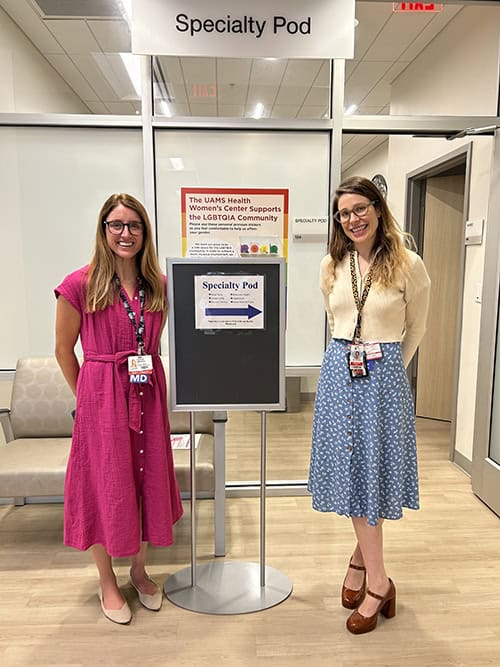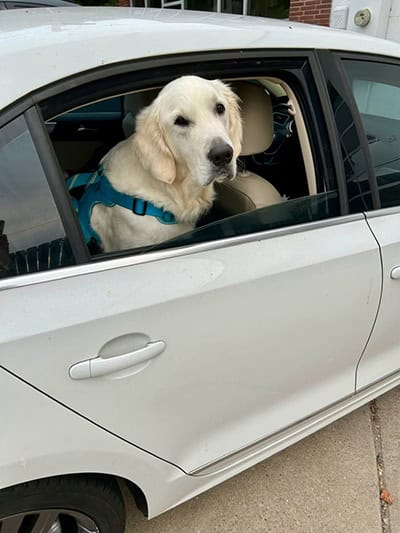A Day in the Life of a Fourth-Year Resident

Most of my rotations this year are focused on preparing me to practice women’s mental health. There is so much flexibility within the program for each resident to make their fourth year what will be the most useful. Residents can create new rotations as well as the long list of those already established. On Monday and Wednesday mornings, I work with two expert faculty in Reproductive Psychiatry, Dr. Ray and Dr. Williams. They see patients on these mornings in a co-located clinic within an Obstetrics practice. Patients are referred for various mental health concerns during pregnancy and postpartum.

My day starts by getting my dog Leonard off to daycare and grabbing a local coffee! I then arrive at the co-located clinic around 7:40 a.m. and review the schedule for the morning. A typical morning has three to four new patients and a handful of follow-up appointments. As a PGY-4, I am seeing new patients and then following those patients. One thing that is quite nice about this clinic is the closeness with which patients are followed, often with anywhere from two to six weeks between appointments. This is a great rotation for any psychiatrist that will be caring for women, since most pregnancies in the U.S. are unplanned. Although I have spent much time on my own learning the principles of women’s mental health and opportunities at other times in residency, having the experience of seeing only pregnant and postpartum patients is very unique. It has been helpful to see how other faculty navigate difficult clinical decisions and discussions with patients. It has also allowed for excellent practice in having risk-risk discussions with patients about treatment options and reviewing physiological and pharmacodynamic changes of pregnancy. There are also printouts of developmental trajectories/organogenesis to inform these discussions with regards to timing of exposures during pregnancy. The diversity of the patient population as well as the motivation for wellness during childbearing years is a special part of this clinic environment.
Midday I grab a quick lunch before an afternoon Addictions clinic. On Wednesday afternoons, I see patients with Dr. Richison. She did her Addiction Medicine fellowship at Vanderbilt and then returned to join the faculty at UAMS. At UAMS she has created a much-needed clinic that is focused on alcohol use disorder, though she cares for patients with all substance use disorders. She has also expanded the addiction training within residency and hospital-wide alcohol withdrawal protocols. Her clinic usually has a new patient and a few follow-ups. My responsibility is to interview new patients and be engaged in follow-up appointments. She has also recommended different textbooks to allow for a solid background in treating substance use disorders. I am currently about halfway through the American Society of Addiction Medicine textbook. Thus far, I have been very appreciative of training in the areas of harm reduction conversations and motivational interviewing principles. Confidence in motivational interviewing is one of my goals for this rotation.
I have a few moments between the last clinic patient and short call to answer some e-mails and review some recent publication alerts.

During periods of being on call in residency, we are responsible for the inpatient psychiatric units at UAMS as well as floor and emergency room consults at UAMS and the VA. This can at times be a lot, particularly in the beginning as an intern. Our residency does a great job of making sure being on call as an intern is both safe for patients and not overwhelming by having a buddy system. Interns are “hip-to-hip” with an upper level for all calls through usually around November, meaning all patients are seen together and the two residents are literally with each other the whole call. This is so helpful with getting used to potentially a new hospital system, how to triage phone calls, documentation, admission protocols, and interviewing patients with a focus on disposition. Weekday short call is from 4:30-8 p.m. with an overlap of the overnight resident arriving at 7:00 p.m. We ended up having a pretty average call in terms of volume and the intern did a great job!
A little after 7:00 p.m., I call it quits for the day and head home to be with my family.
